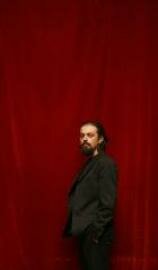Walking on Air
Few newcomers to the industry have taken the comics world by storm as much as G. Willow Wilson. The creator of Cairo, along with illustrator M.K. Perker, Wilson presents a fresh voice and a unique perspective. Her background as a journalist writing about the Middle East and religion in today’s world, as well as the fact that she divides her time between America and Egypt, propel her to interesting heights.
Recently, she and Perker returned with Air, an ongoing series from DC’s Vertigo imprint. The first volume of stories has already been collected, and a second one is coming this fall. A sprawling, labyrinthine epic about a stewardess with a fear of falling, Air incorporates magical realism, Lost-style paradoxes and mysteries, and the modern politics of religion, race, and gender. With a story so massive, and with new events unfolding every issue (by the time Amelia Earhart shows up, it seems fitting…why wouldn’t she be here?), Air has the space to allow Wilson to move slowly, methodically, at just the right pace. What’s unfolding is at once beautiful and scarily addictive. So we had to know what was going on behind it.
Where did the story of Air come from? What led you to create it?
A few years ago, at Schiphol Airport in Amsterdam, I was briefly interrogated by a young blonde stewardess during a secondary security check. That was the inspiration for the first scene between Blythe and Zayn in issue one of Air. The rest sort of followed naturally—which might seem strange, given how bizarre and far-reaching the series is, but it made total sense in my head.
Blythe is an interesting character. Do you yourself feel you know her well, or is she somewhat of a mystery even to you?
Having spent over a year with Blythe, I feel I know her pretty well. I wanted to start with a kind of ingénue character—breathy and perpetually startled and very alien to me personally—and develop her into a force of nature. So that’s what I’ve done.
Where do you see the story heading?
As Blythe comes into her own, the stakes will get higher and higher. She’s made a lot of enemies. The showdown between them is going to be pretty dramatic.
How long do you see this series going on? Do you see it as open-ended?
I’d like to go about 50 issues. That’s a respectable number—enough time for the series to really develop, but not enough time for it to drag on and get pointless. We’ll see if I get my wish.
When did you start reading comics?
I started reading comics when I was about 10 years old. My tween obsession was the X-Men.
Who were your inspirations as a writer?
I have lots! E.M. Forster, William Makepeace Thackeray, Umberto Eco, Hanif Kureishi, CS Lewis.… I could go on.
What fascinates you about the mystical and the magical? Why does it work its way into your writing so seamlessly?
Honestly, the way I write is the way I see the world. If the mystical looks seamlessly integrated, it’s because I don’t see the seams in the first place. To me, the seen and the unseen are inseparable.
Who were your comic-writing inspirations?
Neil Gaiman and Peter Milligan are at the top of the list. Followed by Grant Morrison. I read their stuff as a mopey teenage goth and it really stuck with me.
How do you and M.K. Perker work together? What is your collaborative process like?
We’re each other’s cheerleaders. We interfere in one another’s work only on technical details—otherwise, we function like collaborative fans.
You’ve also worked with DC’s superpowered character Vixen. What drew you to her? How familiar with her were you?
I had no idea who she was until I got assigned to her miniseries. I think I was more a logistical choice than anything else…I’ve lived in Africa, so that terrain isn’t as unfamiliar to me as it would be to a lot of writers. I really enjoyed researching Vixen and having the opportunity to contribute to her ongoing saga.
Do you like working in the superhero genre?
I do, yeah. I would definitely work in the superhero genre again. Writing doesn’t get much better than “Panel 1: Superman floats down through the open skylight.’ It’s a rush to be involved with a story like that.
-- John Hogan









